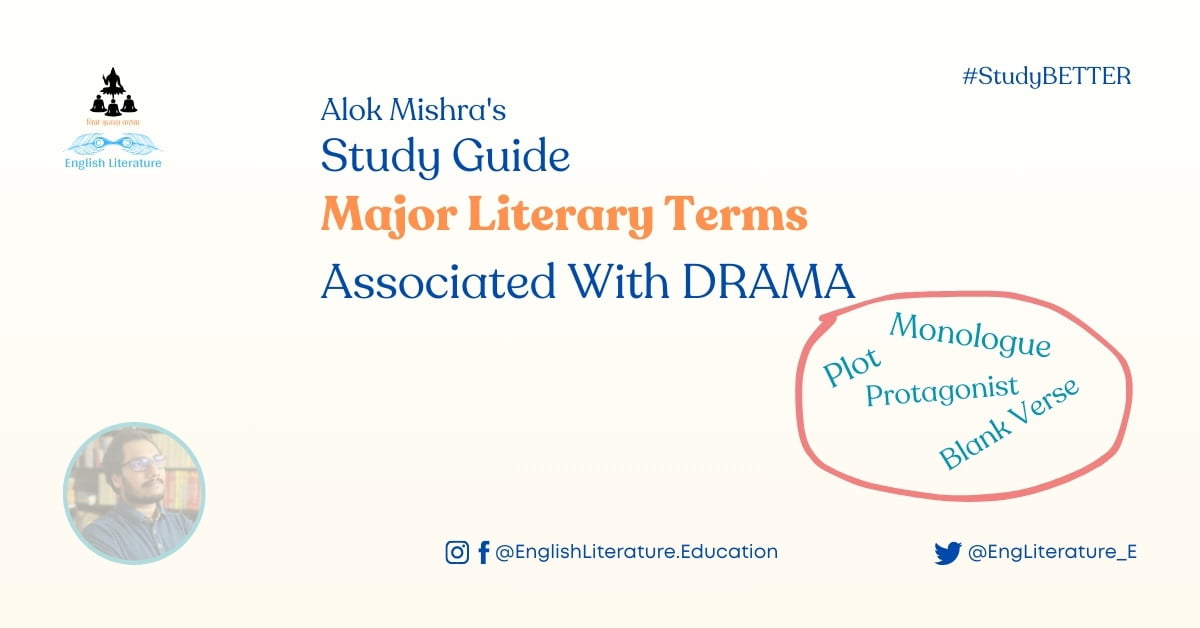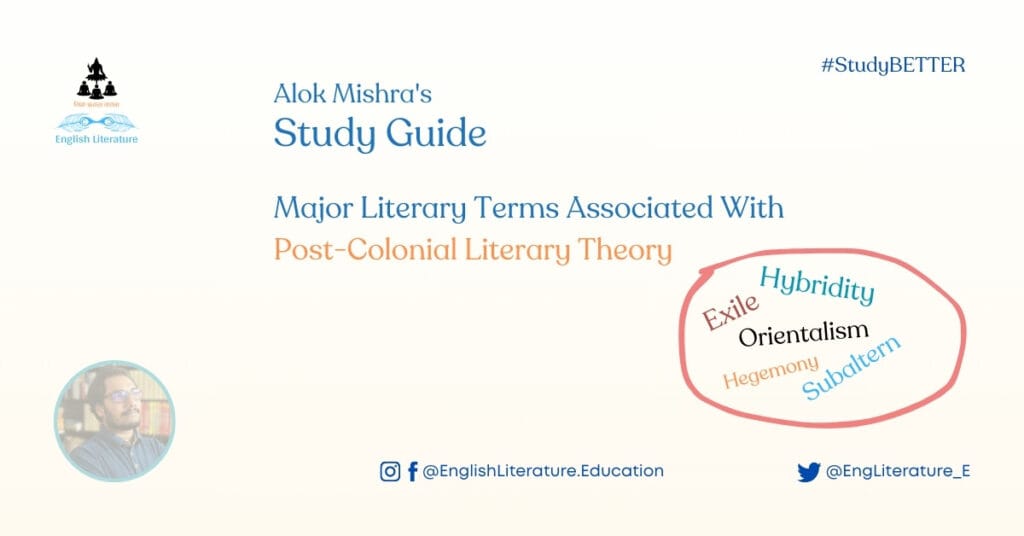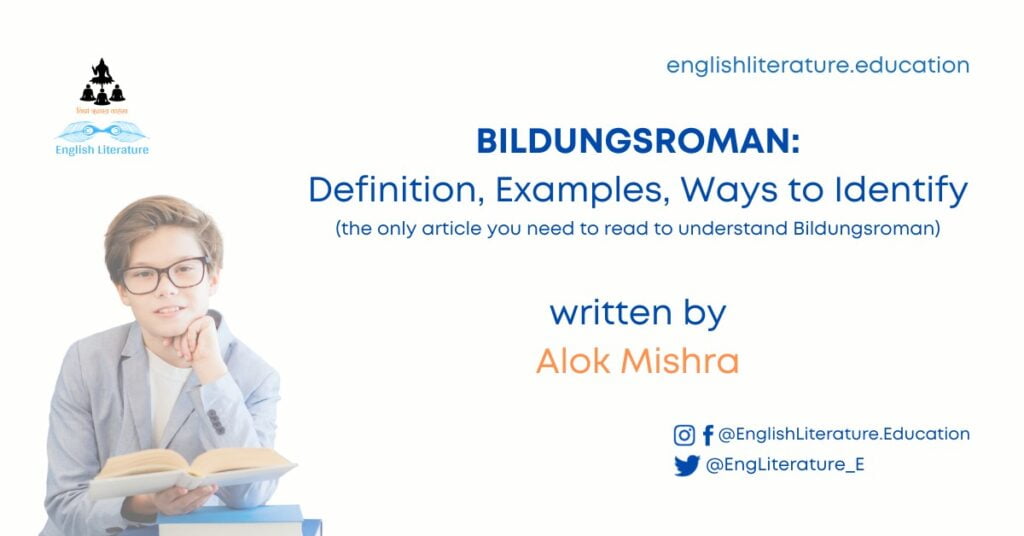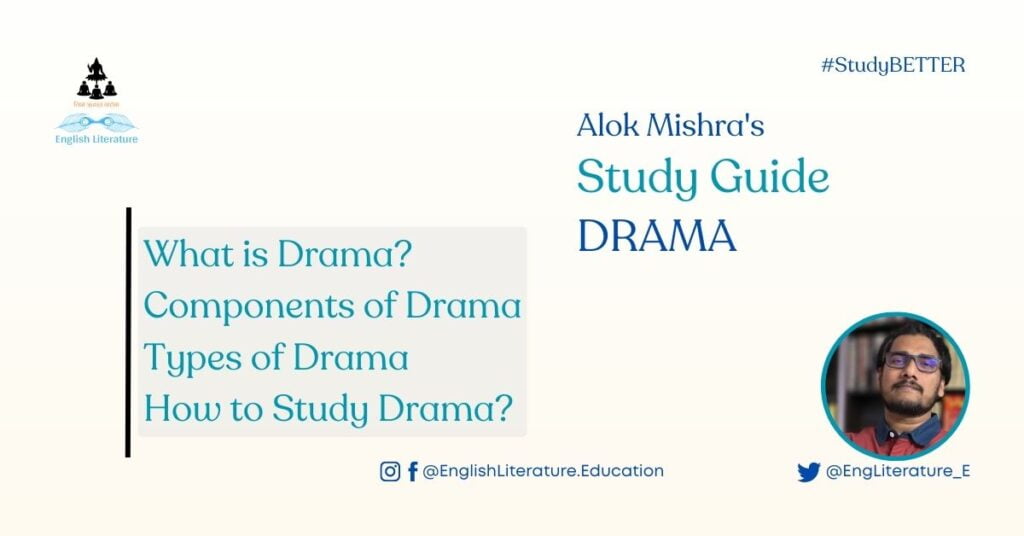Hello, students!
Before you start studying plays written by famous dramatists or some unknown play by an unknown playwright, it becomes important to have an understanding of major literary terms that often occur during the lectures or in an article by some literary scholar or critic that you read. So, in this study guide, I have tried to compile literary terms that will make your venture comfortable as you begin studying plays prescribed in your BA or MA syllabus. Also, if you don’t want to depend on this or any other article whenever you have to check the definition of some literary terms associated with drama, I suggest you buy a suitable dictionary of literary terms and have it on your study table permanently until you become familiar with required terms. Check the best books here – best dictionary of literary terms.
List of literary terms you should know before studying a play:
1. Protagonist:
Definition: The main character in a play, around whom the plot revolves.
Example: In Arthur Miller’s “Death of a Salesman,” Willy Loman is the protagonist.
2. Antagonist:
Definition: The character or force that opposes or goes against the protagonist.
Example: Iago serves as the antagonist to Othello in Shakespeare’s “Othello.”
3. Plot:
Definition: In a drama, the plot refers to the sequence of events that make up the storyline of the play. It includes the unfolding of conflicts, actions, and character interactions that drive the narrative forward. A plot generally has these key elements – Exposition, Inciting Incident, Rising Action, Climax, Aftermath or Falling Action and Resolution.
4. Soliloquy:
Definition: A speech delivered by a character alone on stage, revealing their inner thoughts and feelings. The speech is intended to be heard by the audience so that they know the character (or an idea or event) better.
Example: Hamlet’s famous “To be or not to be” soliloquy in Shakespeare’s “Hamlet.”
5. Monologue:
Definition: A lengthy speech by one character, often addressing other characters or the audience. In general, it is too long to be discernible and distinct from a typical dialogue in a play.
Example: Mark Antony’s funeral oration in Shakespeare’s “Julius Caesar.”
6. Aside:
Definition: A brief comment or remark made by a character directly to the audience, unheard by other characters on stage.
Example: In “Macbeth,” Lady Macbeth says aside to the audience, “Come, you spirits that tend on mortal thoughts…”
7. Dialogue:
Definition: The spoken exchange between two or more characters in a play.
Example: The conversations between Romeo and Juliet throughout Shakespeare’s play.
8. Foreshadowing:
Definition: A literary device in which hints or clues are given about future events in the plot.
Example: The witches’ prophecies in “Macbeth” foreshadow Macbeth’s rise and fall from power.
9. Tragedy:
Definition: A genre of drama characterised by the downfall of the protagonist, often due to a character flaw or external circumstances.
Example: The tragedy of Othello in Shakespeare’s “Othello.”
10. Comedy:
Definition: A genre of drama that aims to amuse and entertain through humour and light-hearted situations.
Example: “A Midsummer Night’s Dream” by Shakespeare is a classic example of comedy.
11. Aphorism:
Definition: A concise and memorable statement or phrase that conveys a universal truth or wisdom.
Example: “All the world’s a stage, and all the men and women merely players” is an aphorism from Shakespeare’s “As You Like It.”
12. Motif:
Definition: A recurring theme, symbol, or idea that contributes to the overall meaning of the play.
Example: The motif of blood in “Macbeth” symbolises guilt and violence.
13. Fourth Wall:
Definition: The imaginary barrier between the actors on stage and the audience, which is typically maintained, but can be broken in some theatrical styles.
Example: Characters addressing the audience directly or acknowledging their presence break the fourth wall.
14. Set Design:
Definition: The physical arrangement and decoration of the stage, including props and scenery.
Example: Elaborate set designs in musicals like “The Phantom of the Opera” enhance the theatrical experience.
15. Blocking:
Definition: The planned movement and positioning of actors on stage, directed by the director for effective storytelling.
Example: In a fight scene, actors’ blocking ensures safety and visual impact.
16. Hubris:
Definition: Excessive pride or arrogance in a character that leads to their downfall in a tragedy.
Example: In “Oedipus Rex” by Sophocles, Oedipus’s hubris blinds him to the truth of his own identity.
17. Climax:
Definition: The point of greatest tension or emotional intensity in a play, often marking a turning point in the plot.
Example: The climax of William Shakespeare’s “Macbeth” occurs when Macduff kills Macbeth in their final confrontation.
18. Foil:
Definition: A character who contrasts with another character, often the protagonist, to highlight their qualities and traits.
Example: In “Hamlet,” the character of Laertes serves as a foil to Prince Hamlet, emphasizing Hamlet’s indecision.
19. Tragic Flaw:
Definition: A character trait or quality in the protagonist that contributes to their downfall in a tragedy.
Example: In “Othello,” Othello’s jealousy is his tragic flaw, leading to his tragic downfall.
20. Ensemble:
Definition: The collective group of actors who perform together in a play, often working harmoniously to convey the story.
Example: In musicals like “Les Misérables,” the ensemble cast contributes to the overall atmosphere and storytelling.
21. Stage Directions:
Definition: Instructions in the script that indicate how characters should move, gesture, and interact with props and the set.
Example: “Exit, pursued by a bear” is a famous stage direction in Shakespeare’s “The Winter’s Tale.”
22. Proscenium Arch:
Definition: The frame or arch that surrounds the stage, separating it from the audience in traditional theatre settings.
Example: Many classic theatres, such as the Royal Opera House in London, feature a proscenium arch.
23. Monomyth (or Hero’s Journey):
Definition: A narrative pattern or structure identified by Joseph Campbell, involving a hero who embarks on an adventure, faces challenges, and undergoes personal growth.
Example: “The Lord of the Rings” by J.R.R. Tolkien follows the monomyth as Frodo Baggins sets out on a quest to destroy the One Ring.
24. Dénouement:
Definition: The final resolution or outcome of the plot, where loose ends are tied up and the story reaches its conclusion.
Example: In “Romeo and Juliet,” the denouement occurs when the two feuding families reconcile after the tragic deaths of their children.
25. Blocking Rehearsal:
Definition: A rehearsal where actors practice their movements and positioning on stage as directed by the director.
Example: During a blocking rehearsal for a musical, actors learn their dance routines and stage entrances and exits.
27. Set Piece:
Definition: A significant and often elaborate part of the stage design, typically used to represent a specific location or scene.
Example: The grand staircase in “The Phantom of the Opera” serves as a notable set piece in the production.
28. Catharsis:
Definition: The emotional release or purging experienced by the audience through the resolution of a tragic plot.
Example: The catharsis felt by the audience as they witness the downfall of Macbeth in Shakespeare’s play.
29. Dramatic Irony:
Definition: When the audience possesses knowledge that one or more characters in the play do not have, creating tension or humour.
Example: In Shakespeare’s “Romeo and Juliet,” the audience knows that Juliet is not really dead when Romeo finds her apparently lifeless body.
30. Blank Verse:
Blank Verse is an unrhymed verse typically written in iambic pentameter, commonly used in dramatic and poetic works.
Example:
“Tomorrow and tomorrow and tomorrow,
Creeps in this petty pace from day to day.” – William Shakespeare, “Macbeth”
I will keep compiling more literary terms to add to this list. I hope it helps you in some way. Keep searching. Keep learning! All the best!
Alok Mishra





3 Comments. Leave new
Good
Good
Nice content. Keep working for the betterment of your and our minds.